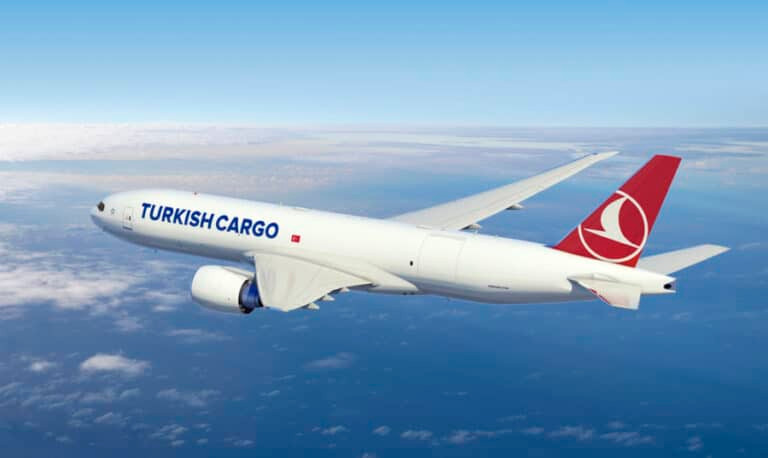Turkish Cargo has ordered three more Boeing 777 Freighters as it continues to soar with record financial results and growth.
The 777 Freighter, which is based on the 777-200LR, can fly 4,900 nautical miles with a payload of 102 tonnes, meaning fewer stops and landing fees, less congestion at transfer hubs, lower cargo handling costs and shorter delivery times.
Turkish Airlines chairman of the board and the executive committee, Ilker Ayci says: “We are excited to expand our efficient cargo fleet with the 777 Freighter. This aircraft has contributed greatly to Turkish Cargo, Turkish Airlines’ successful sub brand, becoming the fastest-growing air cargo carrier in the world. The additional aircraft will provide us more flexibility to serve even more destinations as we continue to grow our global freight network.”
The news comes after Turkish Airlines reported a 25 per cent increase in tonnage and revenue growing by 29 per cent.
The airline has been investing heavily in its fleet by ordering three 777Fs in January, finalising a deal for 25 787-9 Dreamliners in March and taking delivery of Boeing 737 MAXs.
Boeing Commercial Airplanes president and chief executive officer, Kevin McAllister says: “Turkish Airlines has achieved significant success over the past decade. In addition to introducing innovations that have powered the growth of Turkey’s commercial aviation sector and anchored a new state-of-the art airport, the airline is delivering outstanding results and rising in the ranks of elite airlines. We are extremely honoured that Turkish Airlines has placed its trust and confidence in Boeing’s flagship airplanes: the 737 MAX, the 777 and the 787 Dreamliner.”
To support long-term growth of the Turkish aerospace industry, Boeing launched a strategic partnership programme in Turkey last year called the National Aerospace Initiative.
The initiative sets out a strategic collaboration framework in the areas of industrial development, technology acceleration, services collaboration and advanced skill training.
Boeing plans to open an engineering centre in Istanbul to specialise in research and support of Turkey’s aerospace capability.
The company has also expanded its collaboration with Turkish Technic, making it a strategic supplier for Boeing’s Global Fleet Care programme, providing operators with line maintenance, heavy maintenance, component service and repair for multiple aircraft models.



